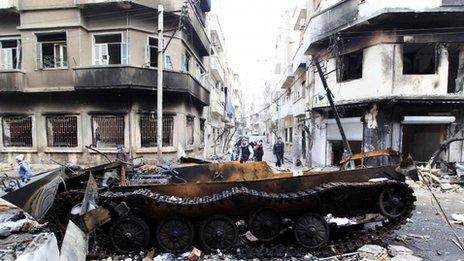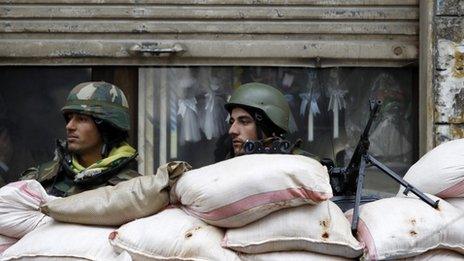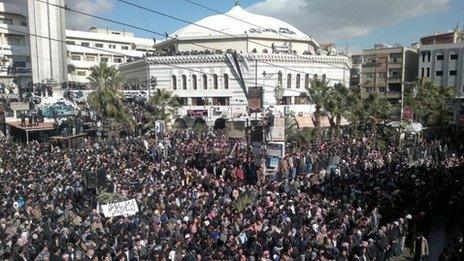Syria crisis: Arab League fails to stem conflict
- Published

The scars of the Syrian conflict are plain to see on the streets of Homs
After more than 10 months and 5,000 deaths, an end to the crisis ravaging Syria remains a distant prospect.
The only sure thing is that in the coming months, many more people will die violent deaths as the conflict becomes increasingly desperate and ugly.
There is no visible way towards a resolution of the struggle between a regime determined to cling to power, and a revolt which long ago passed the point of no return.
In the regional domain, the Arab League's latest proposals have been rejected out of hand by Damascus, and dubbed "unachievable" by opposition activists.
The new league formula for ending the crisis is likely to become the standard adopted by Syria's international critics, which will generally increase the outside pressure on Damascus and its allies but is unlikely to produce practical results in the near future.
The new Arab plan was modelled on the template fashioned for Yemen by the Gulf states, under which the embattled President Ali Abdullah Saleh left his country on Monday having devolved power to his deputy.
The league suggested President Bashar al-Assad should do the same in Syria.
Its plan called for a dialogue between regime and opposition, formation of a national unity government, election of a constituent assembly, a new constitution, a referendum, and free elections.
It was immediately dismissed by the Syrian authorities as part of the "ongoing conspiracy" against the country, and a "blatant interference" in its affairs.
Outside diktats
President Assad has long since launched what he calls a "comprehensive reform process" himself, involving the drafting of a new constitution and the holding of "free" multi-party elections in the coming months.
While his plans have no credibility with the opposition or its external supporters, there was no way he was going to abandon them and accept outside diktats.
The Arab plan also called for the regime and its opponents to begin a dialogue under League auspices within two weeks.
That seems unlikely to happen. Neither side wants it.
The regime is averse to holding talks other than under its own umbrella.
Most activists reject talking to a regime which they say has spilled too much blood for reconciliation to be possible.
The only part of the Arab League initiative that seems to have survived so far is the observer mission on the ground in Syria, whose mandate was renewed by the Arab foreign ministers for a second month on Sunday.
The monitors' report has not been made public, though their commander, Sudanese General Mohammad al-Dabi, spoke about it at length at a news conference in which he attributed violence to both sides.
He argued that the mission had helped bring down the level of bloodshed, although activists say more than 800 people have been killed by security forces since the observers began deploying in late December.
The credibility of the mission - and the unity of purpose of the League effort - have already been diminished, certainly in the eyes of the Syrian regime, by Saudi Arabia's withdrawal from the observer team.
The mission could be terminally jeopardised if the League were to refer the whole affair to the UN Security Council, a step which now seems likely.
The man leading the League campaign to end the Syrian crisis, the Prime Minister and Defence Minister of Qatar, Sheikh Hamad bin Jassim Al Thani, said that if Syria failed to adopt the new peace prescription, the League would hand the matter over to the Security Council.
In such a situation, Damascus would clearly be tempted to retaliate by asking the observer teams to leave, since the initiative on which their presence was based would have ended.

Syrian forces are digging in, with no clear way out of the conflict
International divisions
Recourse to the UN is a scenario long espoused by much of the Syrian opposition and many activists on the ground, who want outside intervention to establish safe havens which they could use as launching-pads for "liberating" the rest of the country.
But there is no clear way forward in the international arena either.
Divisions there were neatly underlined on Monday, when the European Union announced another round of sanctions against Syrian individuals and companies, while Russia was reported to have agreed to supply Damascus with 36 military jets (which will, however, have to be paid for).
Russia has made it clear that it regards even condemnation of Syria at the UN Security Council, far less the imposition of sanctions or any form of military intervention, as a red line.
A Council resolution would be needed to cover anything approaching the kind of intervention many of the regime's opponents would like to see.
With Russia and China poised to veto, that is simply not going to happen unless something changes radically.
So for the moment at least, Syria's fate seems to be left largely to the internal dynamics of the conflict.
There, the trend in some areas has been increasingly towards an armed insurgency.
Whole army units have yet to break off, and by and large the capital Damascus and the second city Aleppo remain relatively untroubled, although many people there are reported to feel that the tide is coming in.
But in other areas, the impression is of a slow fraying of the regime's authority and control.
In parts of the third city, Homs, and other places such as Idlib province to the north-west, Zabadani in the west near Lebanon, and even some of the townships around Damascus, the control of security forces appears to be nominal, patchy or even non-existent.
Whether this represents recognition of realities by the regime, or temporary restraint in deference to the presence of the Arab observers, is not clear.
Since the monitors deployed, the authorities have made some gestures towards implementing the agreement covering their presence.
They have released some detainees, allowed some foreign journalists in with constraints.

The unrest has now spread to the outskirts of Damascus, where thousands attended the funerals of 12 people killed in the past three days in Douma (photo: AFP/HO/LCC)
The mission commander, General al-Dabi, said that security forces had also stopped shooting at demonstrators, though activists dispute that.
But the Arab League resolution on Sunday reported that there had been only "partial and insufficient progress in implementing some of the commitments taken on by the Syrian government" when it signed the protocol.
It is hard to imagine that the monitors, if they stay, will be able, as per their mandate, to verify the regime's complete compliance with the governing protocol which calls for all armed elements to be withdrawn, all detainees released, and all violence ended.
More likely, perhaps, the situation will simply grind on, with more armed attacks by rebels - three Syrian Army brigadiers have been killed in the past week alone - and further repression by regime forces and their militia auxiliaries, the shabbiha, drawn almost entirely from Mr Assad's Alawite community.
It and other minorities such as the Christians have largely continued to support the regime against a revolt which is generally based among the poorer sections of the majority Sunnis.
Fearing a takeover by Islamist militants, some middle-class Sunnis and merchants favoured by the regime have also tended to stick with the regime.
As the situation has worsened, confessional sentiment has also risen, aggravating fears of a slide into sectarian civil strife and disintegration.
How solid the regime's pillars of support really are, and how much they will be eroded as conditions deteriorate, is hard to predict, especially once economic factors kick in harder as sanctions are tightened.
But barring an unpredictable collapse or an internal coup of some kind, the regime seems to have enough hard-core support - and the determination - to defend its grip on power for months to come, if not longer.